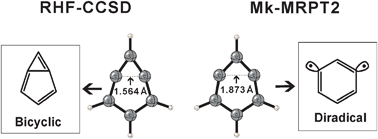A companion perturbation theory for state-specific multireference coupled cluster methods†
Abstract
A partitioning scheme is applied to the state-specific Mukherjee multireference coupled cluster method to derive a companion perturbation theory (Mk-MRPT2). A production-level implementation of Mk-MRPT2 is reported. The effectiveness of the Mk-MRPT2 method is demonstrated by application to the classic F2 dissociation problem and the lowest-lying electronic states of meta-benzyne, including computations with up to 766 atomic orbitals. We show that Mk-MRPT2 theory is particularly useful in multireference focal point extrapolations to determine ab initio limits.

- This article is part of the themed collection: Electronic structures and reaction dynamics of open-shell species

 Please wait while we load your content...
Please wait while we load your content...